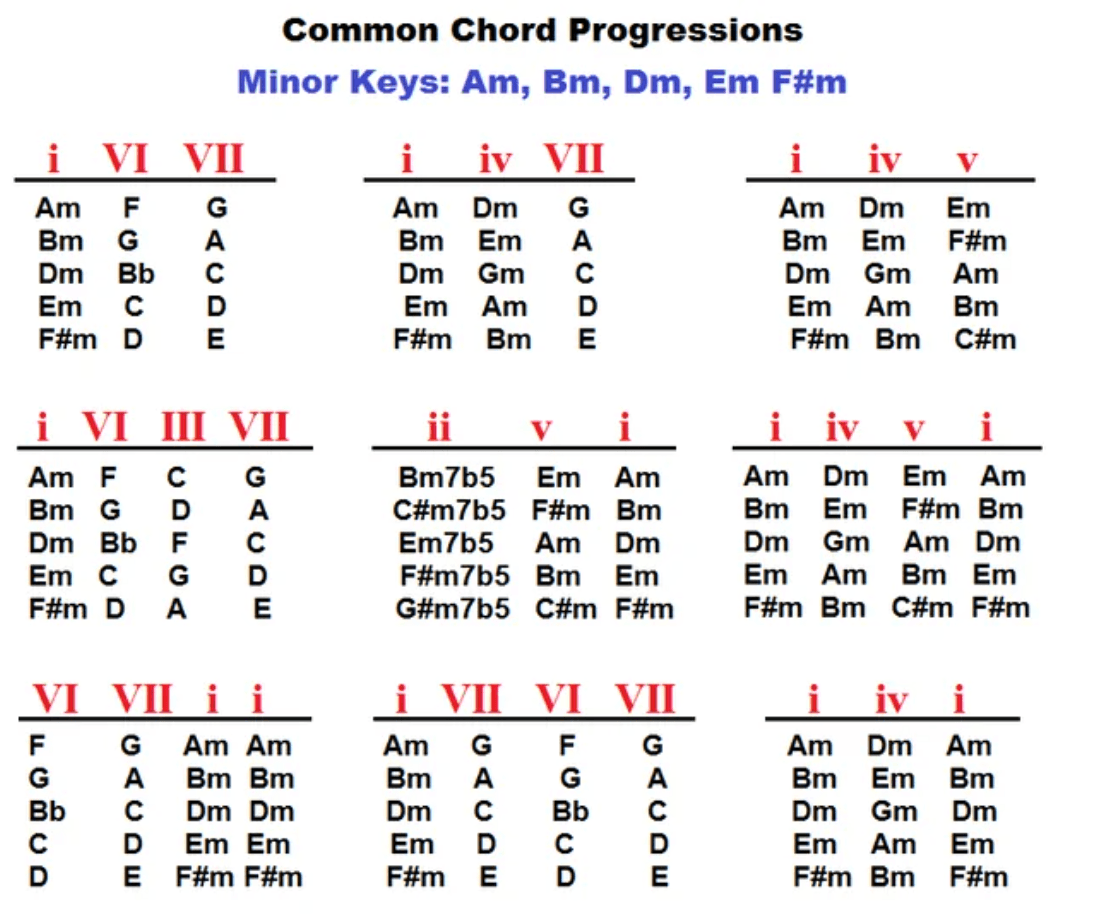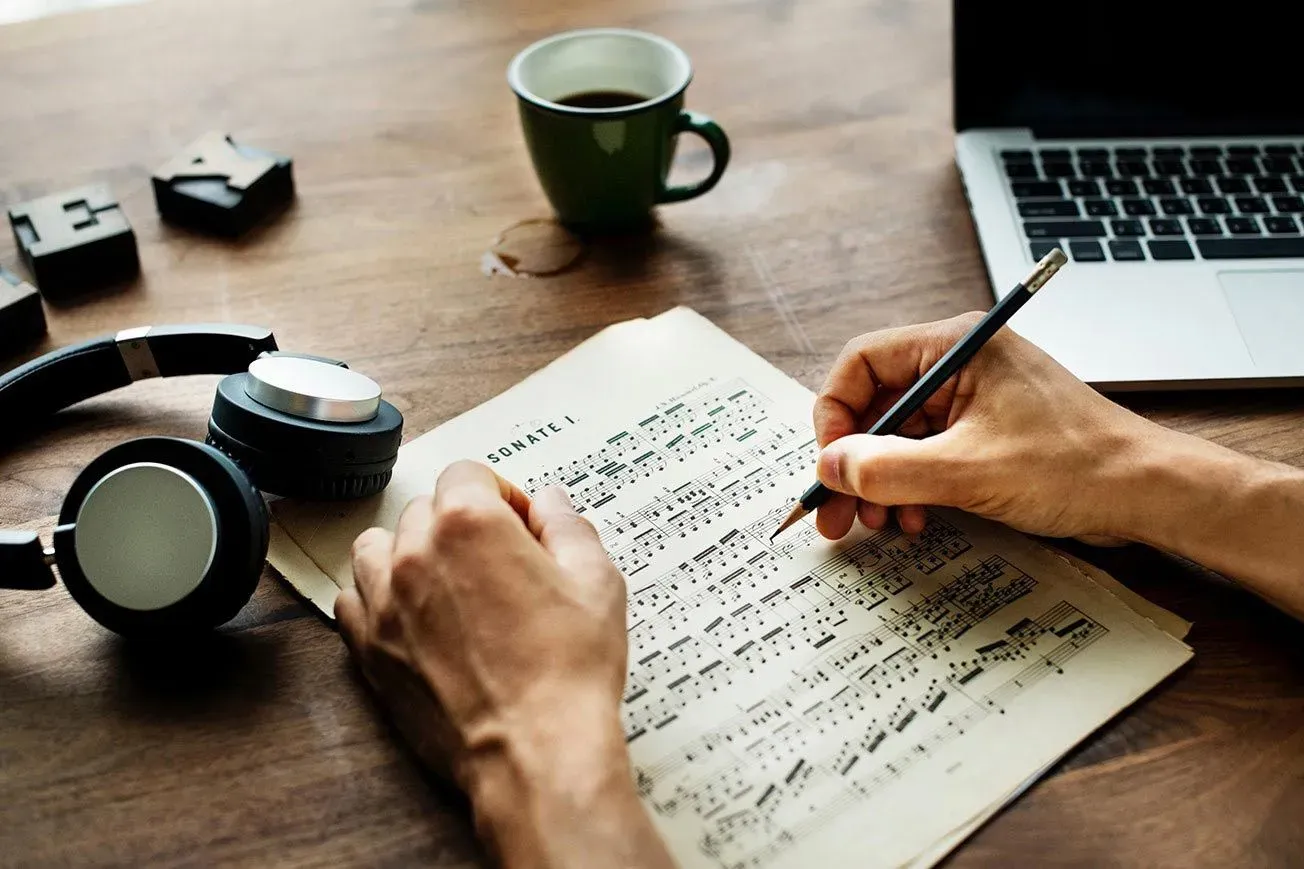Ever wondered what an AI music composer is? It's a game-changing tool that offers musicians, both pros and amateurs, a canvas to create and customize melodies, chords, and even lyrics.
Here's why you should keep reading: we'll dive into how AI helps streamline the music-making process while amplifying your creativity.

The Nitty-Gritty: How Does an AI Music Composer Work?
Whether you're a seasoned musician or just a music enthusiast, you've probably heard about AI revolutionizing various industries.
But how does this technological marvel fit into the music world?
Let's delve into the complexities and simplicities of an AI music composer.
Diving Into Algorithms and Databases: The Role of Machine Learning
At the core of any AI music composer is machine learning, a subset of artificial intelligence that gives computers the ability to learn without being explicitly programmed.
These AI tools harness complex algorithms to sift through enormous databases of existing music compositions.
By doing this, they study different musical elements such as melody, harmony, rhythm, and even lyrics.
The Intricacies of Neural Networks
After the machine learning algorithms gather enough data, neural networks come into play.
These are like the 'brain' of the AI, mimicking the way human neurons work but in a simplified manner.
By using neural networks, AI music composers can generate new compositions that capture the emotions, style, and pacing of the songs in their databases.
The Magic of MIDI
MIDI (Musical Instrument Digital Interface) is a protocol for communicating musical information between digital devices.
Many AI music composers, like Musenet, utilize MIDI files to build a comprehensive musical vocabulary.
This enables the AI to generate music that not only sounds good but also follows musical theory rules, offering a rich playground for both novice and experienced musicians.
Real-Time Analysis and Adaptation
Some advanced tools offer real-time adaptation features, learning from user inputs to refine their music generation capabilities.
If you have specific requirements or styles you prefer, the AI audio production system will recognize these preferences and generate music that aligns more closely with your taste over time.
The Importance of Data Sets
Many AI music composers are only as good as the datasets they’re trained on.
Quality and variety in data are crucial. An eclectic mix of genres, instruments, and musical elements ensures that the AI can produce a wide range of musical styles.
From classical compositions to rock anthems, a diverse dataset is essential for a well-rounded audio AI tool.
Keeping It Human: The Creative Collaboration
While AI can handle the technical aspects of composing melody and even generating lyrics, the human element is irreplaceable. These tools serve as a springboard for creative expression, not a substitute.
They can help overcome creative blocks or even educate users on the complexities of music theory, but the final creative vision will always be uniquely human.
By understanding how an AI music composer works, you not only demystify the technology but also learn to utilize it as a powerful extension of your creative toolbox.
Whether it’s laying down a catchy beat, crafting intricate harmonies, or penning emotional lyrics, AI is there to augment, not replace, your artistic journey.
Generative Music: An Old Concept with a New Twist
Generative music is far from a novelty; it has roots reaching back into the earliest days of computer technology.
However, with the advent of AI and blockchain, generative music has experienced a renaissance, gaining newfound complexity and versatility.
Here, we dive deep into the history and current applications of generative music to understand its significance in the intersection of technology and culture.
A Brief History of Generative Music
Generative music, or music created by systems, has a history that stretches back to the 1950s. During this time, avant-garde musicians and composers like Max V.
Mathews and Lejaren Hiller began using computer-generated algorithms to produce compositions such as the Illiac Suite for string quartet.
These early works showcased the dual nature of music as both sound signal and symbolic representation.
The conversation around generative music took a significant turn in the 1980s when IBM announced that scientist Kemal Ebcioğlu had programmed a mainframe to generate chorales in the style of Bach.
The corporate interest in this musical venture opened up questions about the commercial potential of generative music.
Concurrently, composers like David Cope were working on their own projects, employing programming languages like LISP to model and generate music in the style of classical composers.
The Advent of Deep Learning and Neural Networks
By the early 2000s, new players like François Pachet had entered the scene with jazz improvisation modeling systems like the Continuator.
With the development of deep learning techniques and neural networks, AI music generation took on a new dimension.
AI systems could now use large datasets to create information that closely resembles existing music, pushing the boundaries of what was considered possible.
Generative AI x Blockchain
The blockchain has introduced another layer of complexity and opportunity for generative music.
Musicians like Imogen Heap have explored blockchain as a platform for not just distributing music but also as a way of establishing egalitarian economic exchanges within the music industry.
However, questions about the sustainability of these blockchain platforms remain unanswered, especially given the transient nature of some projects.
Sound and Symbol in the Age of AI and Blockchain
Today, generative music exists at the intersection of sound signal and symbolic representation.
AI technologies like OpenAI's ChatGPT and DALL-E 2 have turbocharged generative techniques, making it possible to create music and art that is as complex as it is innovative.
Artists like patten have even released albums composed using such advanced AI models, challenging our conventional notions of music and art.
Code & Corps
The world of creative coding has facilitated the procedural generation of sound and visuals, making it possible for artists to script interactions and create generative audiovisual works.
Platforms like Sonic Alchemy highlight the work of artists like Alida Sun and Boreta, whose generative art is sold as unique works.
Commodity Form or Noise
The emergence of NFTs has prompted discussions about the commodification of generative art and music.
While some see the NFT as a way of establishing shared ownership between artist and spectator, others view it as reducing generative art to a fixed commodity form.
This dichotomy raises critical questions about the very nature of generative music.
Reflecting on Generative Music's Past, Present, and Future
Generative music has undergone significant transformations, shaped by technological advancements and cultural shifts.
It's essential to engage critically with these developments, considering both the creative potential and the ethical implications.
As Jacques Attali posited in his work "Noise," music has always been a harbinger of broader cultural and economic trends.
Generative music stands as a testament to this, embodying both the technological marvels and the cultural questions of our time.

The 9 All-Stars of AI Composers in 2023: Revolutionizing the Music Landscape
The dawn of the AI era has significantly influenced various industries, and music is no exception.
This year, a new roster of AI composers has emerged, each showcasing unique capabilities and applications that are transforming how music is composed, produced, and even understood.
Here are the nine all-stars of AI composers in 2023 that are setting an exceptionally high standard in audio production.
1. Empress Song Idea Generator
Empress Song Idea Generator stands out for its unique ability to kickstart your composing journey based on emotions.
Just type in the feeling you want to express—whether it's euphoria, depression, or anything in between—and the AI generates a musical piece that resonates with that emotion.
This tool takes musical expression to a new, more intuitive level.
2. Musenet
Unlike many other AI composers, Musenet works by analyzing MIDI files to build an internal musical vocabulary.
This enables the platform to compose intricate and complex pieces that can rival the works of human composers in both technique and emotional depth.
Musenet isn't just a tool; it's like a musical linguist that understands the essence of various compositions and styles.
3. Soundraw
Simplicity and accessibility are the hallmarks of Soundraw. With a simple click, you can generate original, royalty-free music tailored to your project's requirements.
This tool is incredibly useful for independent filmmakers, podcast creators, or anyone seeking top-notch, unique music without the legal complexities.
4. Amper Music
Amper Music makes music composition accessible even to those with limited knowledge of music theory.
Its user-friendly interface guides you through the composing process, allowing you to create complex pieces without getting entangled in the complexities of scales, chords, and harmonies.
5. Jukebox
One of the most versatile AI composers on the list, Jukebox can generate music in multiple genres and styles.
From classical orchestral compositions to modern hip-hop beats, Jukebox offers an expansive musical range, making it a favorite among producers who like to experiment with different musical forms.
6. Melodrive
Melodrive takes real-time audio generation to a new frontier.
It can compose emotionally variable music in real-time, adjusting its compositions to the emotional currents of a movie scene, video game, or interactive experience.
Melodrive adds an extra layer of immersion and expressivity that traditional soundtracks often can't provide.
7. Loudly
For those who like to get their hands dirty in digital audio workstations (DAWs), Loudly is an indispensable tool.
It allows you to import stems directly into your DAW, offering limitless possibilities for further manipulation and refinement.
The platform effectively bridges the gap between AI-generated music and human-led production processes.
8. Soundful
Soundful goes a step beyond by enabling an unlimited number of tracks in its compositions.
This allows for unparalleled complexity and layering, offering a rich audio experience that can suit a variety of artistic and commercial applications.
9. Boomy
Last but not least, Boomy simplifies the song creation process to an extent where even the least experienced can make original songs with minimal effort.
The platform is designed for quick and efficient music-making, making it ideal for creators on the go.
The Future Sounds Good
These AI composers are not just tools; they are revolutionary platforms that are redefining what is possible in the world of music.
From emotionally-driven compositions to real-time adaptive soundtracks, the future of music composition looks promising, vibrant, and extraordinarily innovative.
Whether you're a seasoned composer, a budding artist, or someone who just loves to experiment with sound, these AI composers offer a new avenue for musical expression and creativity.
Introducing the Empress Suite: The Future of AI Music Tools
In an age where technology is revolutionizing creative processes, the Empress Suite stands as a monumental stride in AI-powered music composition.
This suite doesn't just automate music creation; it evolves it, offering a set of specialized tools that are redefining how we approach each element of a song.
Let's dive into each of these ground-breaking AI tools.
1. Melody Mind: The Ultimate Melody Generator
Imagine having an AI assistant that could conjure up melodies on demand, tailored to your exact specifications. That's Melody Mind for you.
This tool allows you to input the instrument, chords, genre, and BPM, offering you the creative freedom to generate anything from a delicate flute melody in a Jazz style at 120 BPM to a haunting piano piece in a minor key.
The possibilities are endless, making it a versatile tool for all composers, regardless of genre or style.
2. Lyric Lab: The Wordsmith for Your Songs
Crafting lyrics can often be the most challenging part of songwriting.
However, with Lyric Lab, you can let the AI be your personal wordsmith. Input the genre—be it Futuristic Sci-Fi or classic country—and tone, such as ominous or joyful.
The AI will then craft compelling lyrics that fit your vision and theme, removing the dread often associated with facing a blank page.
3. Chord Candy: The Sweet Spot for Harmonies
Sometimes, the harmonic foundation can make or break a song. That's where Chord Candy comes into play.
This feature allows you to input the instrument, key, genre, and BPM, offering an easy and efficient way to create harmonic structures.
Whether you're looking to compose a sultry sequence in E minor for an R&B track or a driving progression for a rock anthem, Chord Candy will be your go-to for all things harmony.
4. Bass Brain: All About That Bass
The bassline is the backbone of many musical genres, especially when it comes to setting the groove.
Bass Brain lets you input the type of bass, chords, genre, and BPM.
So, whether you're into electronic music and want a pulsating bass line that'll set the club on fire or prefer something more subdued for an acoustic set, this tool has got you covered.
5. Drums De Dior: Rhythms that Resonate
The heartbeat of a song often comes from its rhythm, and Drums De Dior lets you set that heartbeat to whatever speed or style you prefer.
Just input the genre and BPM, and the AI will generate a beat tailored to your needs.
Whether you're in the mood for a soft lo-fi beat for your coffeehouse set or an aggressive metal rhythm for a headbanging session, Drums De Dior can accommodate.
6. Harmonious Hitmaker: Transforming Titles into Hits
What does a name signify? In the musical realm, it holds considerable weight. Harmonious Hitmaker takes your song titles and transforms them into potential chart-toppers.
Just input the emotion and genre, and this AI tool will tailor-make a hit that not only lives up to its name but potentially propels it to the top of the charts.
Innovations in Musical Creativity
The Empress Suite is more than just a toolkit; it's a groundbreaking ecosystem that unlocks endless opportunities for musicians, composers, and anyone interested in exploring the musical landscape.
By leveraging its distinct AI-driven capabilities, it paves the way for a future where the lines between human ingenuity and artificial intelligence are progressively indistinct, ushering in a novel epoch of musical ingenuity and creative liberation.

AI Inspiration and Music Education: A Symbiotic Relationship
The rise of AI music tools represents more than just a technological marvel; they offer a transformational shift in how we approach music education.
As more educators and students embrace this technology, it's evident that AI has not only become an innovative asset for music production but also a valuable educational resource.
Learning Through Interaction: The Hands-On Experience
One of the best ways to understand any concept is to dive right into it, and AI music tools provide a practical platform to do just that. For instance, an aspiring composer can experiment with chord progressions or different scales without spending hours studying theory.
You learn by interacting with the tool, which offers real-time feedback and suggestions, thus making the learning process much more engaging and intuitive. This immediate hands-on experience amplifies understanding and retention.
Bridging Theory and Practice: A Seamless Connection
Traditionally, music education has involved a deep dive into theory before one could apply those concepts in practice. With AI tools, however, this linear path is no longer the only option. Students can start with the creative aspect of composing and, through interaction with the AI, gradually gain insights into the theory behind their choices.
This approach makes the relationship between theory and practice more harmonious, turning each composition into a lesson itself.
Rhythmic Understanding: Breaking Down the Beat
Rhythm is often considered one of the most challenging aspects of music to teach. However, AI tools can simplify this complex subject by breaking it down into manageable parts.
For instance, a tool that helps design drum patterns can also offer explanations or suggestions for different rhythmic elements, helping the user understand not just how to create a rhythm but why certain rhythms evoke particular emotional responses or fit certain genres.
AI as a Feedback Mechanism: The Continual Learning Loop
One of the most powerful features of AI in music education is its ability to provide instant feedback.
This helps to create a continual learning loop where students can implement changes, see the effects, and understand the reasoning behind those effects.
It’s like having a teacher by your side at all times, offering guidance and constructive feedback, further enriching the learning experience.
Beyond Music: Developing Transferable Skills
Engaging with AI music tools not only improves musical skills but also encourages critical thinking, problem-solving, and even programming skills.
These are all transferable skills that can be applied in many other disciplines and professional fields, making the educational value of these tools even more significant.
Ready to unlock a world of musical possibilities?
Choose Empress to guide you through every step of your music-making adventure. Your dream track is just a click away.
FAQs: AI Music Composer
Q1: What is an AI music composer?
A tool that generates music using machine learning and algorithms.
Q2: Do I need a musical background to use Empress?
No, it's designed for both experts and novices.
Q3: Is the music generated by Empress royalty-free?
Yes, the generated music is royalty-free.
Q4: What kinds of music can I create with Empress?
Virtually any genre, from jazz to classical
Q5: How do I get started?
Simply sign up and choose your preferred Empress tool to begin your musical journey.
Follow the future of music with Empress. Check out our blog to learn how you can effectively use these AI music tools.


